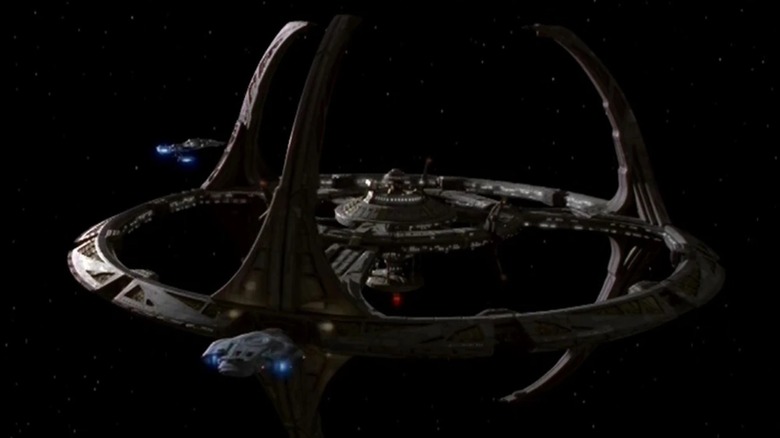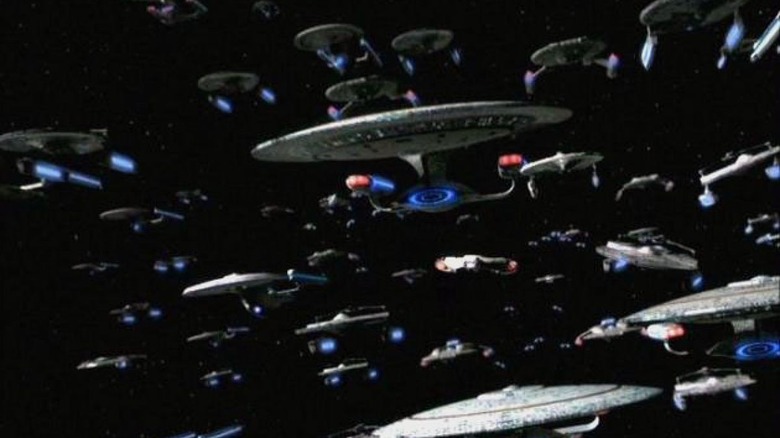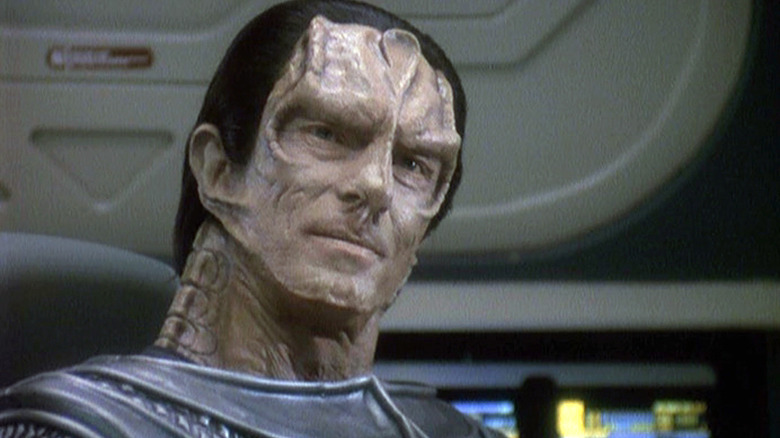Why Star Trek: Deep Space Nine's Dominion Wars Caused Tension Behind The Scenes
"Star Trek" is an explicitly pacifist show. Creator Gene Roddenberry was very clear when he invented the premise that "Star Trek" wasn't going to be about inter-species wars, and that battle wasn't going to be the show's focus. True, there are several episodes of the original "Star Trek" series that focus on tactics and battleship-like maneuvers, but the general idea was that the USS Enterprise could solve problems without having to kill or "defeat" anyone.
These notions only became stronger in the days of "Star Trek: The Next Generation," a series that was more explicitly about diplomacy and pacifism than the original series. Again, "Star Trek" characters were armed with weapons, but violence was never assumed to be the only natural course of action. If the Federation was ever on the brink of war (with an alien race like the Romulans, for instance), it was always spoken of as civilization's ultimate failing. War, Trekkies saw time and again, was something to be avoided at all costs.
Those notions broke down, however, on "Star Trek: Deep Space Nine," a show about conflict. "Deep Space Nine" was set on a remote space station that orbited Bajor, a planet undergoing a reconstruction. Bajor had just survived a near-genocide, and, during its recovery period, was tilting dangerously close to a corrupt theocracy. Starfleet was there to oversee the reconstruction. Gentle Federation citizens now had to directly communicate with warmongers, religious zealots, and, worst of all, capitalists. Later on, the Dominion — a conquering body from across the galaxy — would threaten outright war. It's hard to remain peaceful when everyone wants to fight.
In a 2011 StarTrek.com retrospective with "Deep Space Nine" co-creator Rick Berman, he recalled butting heads with showrunner Ira Steven Behr over whether or not war belongs in "Star Trek." Behr theorized that it does.
War in Star Trek
The Dominion War story arc began with 1997's "Call to Arms," the final episode of the show's fifth season, and would serve as a backdrop for "Deep Space Nine" all the way until the end of the series in 1999. The War not only involved the Dominion and the Federation, but the Cardassians, the Klingon Empire, the Romulans, and, right at the end, the Breen. There were multiple episodes devoted to the kind of trauma war inflicts on a culture, and the moral compromises that otherwise upstanding people have to make in desperate situations. Notably, Captain Sisko (Avery Brooks) discovers that his moral code isn't as strong as he assumed. Many, many people die in the conflict.
The Dominion War didn't come out of nowhere. "Deep Space Nine" laid the groundwork for an impeding conflict since the start of the series. It took five years before Ira Steven Behr could tell a war story. The delay, it seems, was because co-creator Rick Berman didn't like the idea. "Star Trek," he felt, should remain about diplomacy. Eventually, Berman seems to have agreed to let Behr oversee a war-centric story arc, but expected it to be over after a quarter of a season. Berman recalled:
"The whole idea of the Dominion Wars, the idea that Ira wanted an arc that was going to last a season or perhaps longer, he and I had a lot of disagreement about that. And that was all based purely on the fact that Gene had been very specific to me about not wanting 'Star Trek' to be a show about intergalactic wars, interspecies wars. He didn't want it to be about humans fighting wars against other species."
But Behr wanted to throw the old ways to the winds.
Six episodes and you're done, right, Ira? ... Right?
Berman continued:
"I felt that the whole arc of these wars was something that could get done in half-dozen episodes. Ira felt differently and he pushed it, and it went longer than I'd hoped it'd go. But it wasn't like a situation of, 'Wow, Ira is in his ninth episode and Rick thought he was only going to do four.' I mean, I read every story. I read every script. I discussed every story and script with Ira and whoever the writers were. I was aware of it. I was not necessarily happy that it went as long as it did. But these are the kinds of disagreements that people involved with a television show have."
It seems that Behr won out in most situations. Many "Deep Space Nine" fans would agree that Behr was in the right, as the Dominion War story arc is one of the most complex, sprawling, and morally sticky in the entire "Star Trek" universe. "Deep Space Nine" stood as a direct challenge to Gene Roddenberry's idealism, positing that even the best intentions can be eroded by an aggressor.
Is that true to the spirit of "Star Trek?" Even huge "DS9" fans like myself would argue that it isn't. "Star Trek" typically serves as an aspirational series, a means to explore a future wherein war is at an end, there's no more money, and diplomacy rules all interactions. The problem is that "Star Trek" became too expansive for its own good. It introduced many "wild cards" into its mythos, painting a broader galaxy in which war and capitalism did indeed still exist. It just wasn't a part of Earth.
To the credit of "DS9," though, war was never, ever glorified. It was always, always depicted as a horrendous failing.


